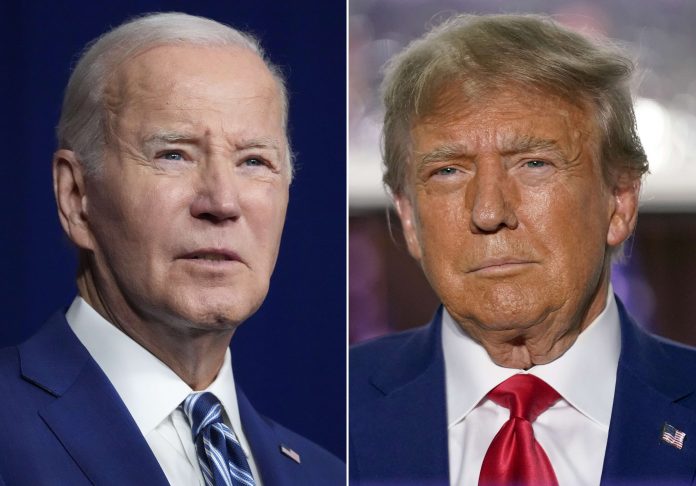
By SEUNG MIN KIM, COLLEEN LONG, ZEKE MILLER and JILL COLVIN
Associated Press
WASHINGTON (AP) — President Joe Biden and former President Donald Trump will make dueling trips to the Mexican border in Texas on Thursday after congressional talks on a deal to rein in illegal migration collapsed.
The visits underscore immigration’s central importance in the 2024 presidential race and how much both Biden and Trump are seeking to use the nation’s broken system to their political advantage.
Biden will travel to Brownsville, Texas, in the Rio Grande Valley, an area that often sees large numbers of border crossings, White House press secretary Karine Jean-Pierre said Monday. He will meet border agents and discuss the need for bipartisan legislation. It would be his second visit to the border as president. He traveled to El Paso in January last year.
“He wants to make sure he puts his message out there to the American people,” Jean-Pierre said.
Trump, for his part, will head to Eagle Pass, Texas, about 325 miles or 520 kilometers away from Brownsville, another hotspot in the state-federal clash over border security, according to three people who spoke to The Associated Press on condition of anonymity to discuss the plans.
The number of people who are illegally crossing the U.S. border has been rising for complicated reasons that include climate change, war and unrest in other nations, the economy, and cartels that see migration as a cash cow.
The administration has been pairing crackdowns at the border with increasing legal pathways for migrants designed to steer people into arriving by plane with sponsors, not illegally on foot to the border. But U.S. policy right now allows for migrants to claim asylum regardless of how they arrive. And the numbers of migrants flowing to the U.S-Mexico border have far outpaced the capacity of an immigration system that has not been substantially updated in decades. Arrests for illegal crossings fell by half in January, but there were record highs in December.
Biden has excoriated Republicans for abandoning the bipartisan border deal after Trump came out in opposition to the plan to tighten asylum restrictions and create daily limits on border crossings. Trump, meanwhile, has dialed up his anti-immigrant rhetoric, suggesting migrants are poisoning the blood of Americans.
Trump’s campaign says Biden’s plan to visit the border is a sign that the president is on the defensive over immigration and the issue is a problem for his reelection effort. Trump’s campaign press secretary, Karoline Leavitt, said Biden was chasing Trump and is responsible for the “worst immigration crisis in history.” The White House announcement came after Trump’s planned trip had been reported.
Biden’s camp says it’s House Republicans who are on the defensive, after Trump flatly said he told GOP legislators to tank the bill that would have funded border agents and other Homeland Security authorities. The New York Times first reported the travel.
While he continues to criticize Republicans for legislative inaction, Biden is considering executive actions to help discourage migrants from coming to the U.S. Among the actions under consideration by Biden is invoking authorities outlined in Section 212(f) of the Immigration and Nationality Act, which give a president broad leeway to block entry of certain immigrants into the United States if it would be “detrimental” to the national interest.
But without changes to law, any executive action taken by the administration that cracks down on border crossings is likely to be challenged in court. The White House has informed some lawmakers on Capitol Hill that Biden will not announce an executive order on immigration during his border trip on Thursday, according to a person familiar with the conversations.
“There is no executive action that would have done what the Senate bipartisan proposal would have done,” Jean-Pierre said. “Politics got in the way.”
According to an AP-NORC poll in January, concerns about immigration climbed to 35% from 27% last year. Most Republicans, 55%, say the government needs to focus on immigration in 2024, while 22% of Democrats listed immigration as a priority. That’s up from 45% and 14%, respectively, compared with December 2022.
Trump is again making immigration the centerpiece of his campaign, seizing on images of migrants sleeping in police stations and in hangars as proof that Biden’s policies have failed. He’s made frequent trips to the border as a candidate and president.
During his 2016 campaign, he traveled to Laredo, Texas in July 2015 for a visit that highlighted how his views on immigration helped him win media attention and support from the GOP base. Since leaving office he’s been to the border at least twice, including to pick up the endorsement of Texas Gov. Greg Abbott.
Biden, meanwhile, visited the border only once, and he did not come into contact with any migrants. Rather, he inspected Customs and Border Protection facilities and walked a stretch of border wall. During negotiations on the border bill, he suggested he’d shut down asylum if given the power, a remarkable shift to the right for Democrats who are increasingly concerned by the same scenes of migrants encampments, and are asking the administration to speed up work authorizations so families who have arrived can at least seek employment.
The failure of the border bill this month has caused the Homeland Security Department, which controls the border, to assess its priorities and shift money between its agencies to plug holes. U.S. Immigration and Customs Enforcement is considering slashing detention beds to 22,000 from 38,000 and reducing deportation flights. That would mean more migrants released into the U.S. who arrive at the border.



















